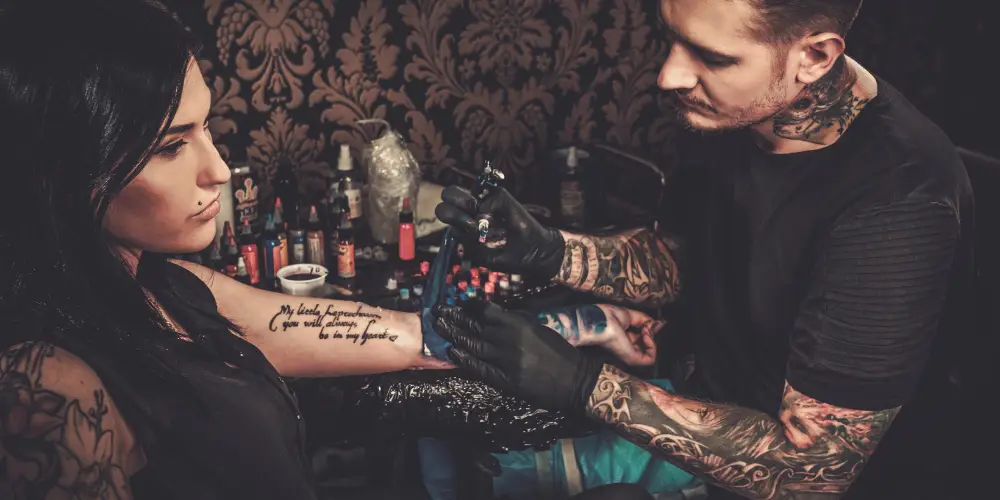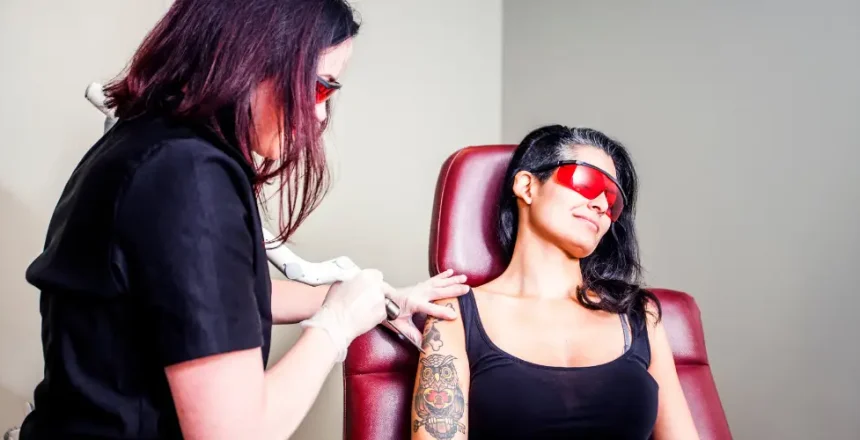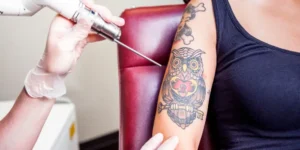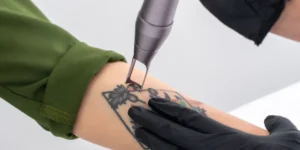Introduction
Tattoos have become increasingly popular in recent years, with people using them as a form of self-expression and art. However, along with the rise in tattoos, there has also been a surge in tattoo regret. Many individuals find themselves wanting to remove their tattoos for various reasons. Tattoo regret is a complex and personal experience that can have both emotional and practical implications. In this blog post, we will explore the reasons behind tattoo regret, the process of tattoo removal, considerations to keep in mind before getting a tattoo, and the emotional impact of tattoo removal.
One of the main reasons for tattoo regret is a change in personal circumstances or taste. What may have seemed like a great idea at one point in time may no longer resonate with an individual’s current lifestyle or beliefs. For example, someone who got a tattoo of their partner’s name during a passionate relationship might later regret it after the relationship ends. Similarly, trends come and go, and what was once considered fashionable may now be outdated or no longer appealing.
Another common reason for tattoo regret is dissatisfaction with the quality or appearance of the tattoo itself. Tattoos are permanent marks on our bodies, and if they are not done well or do not meet our expectations, it can lead to feelings of disappointment and regret. This could be due to poor craftsmanship, misspelled words or incorrect translations, or simply not liking how the design turned out.
Additionally, societal perceptions and stereotypes surrounding tattoos can contribute to feelings of regret. While tattoos are becoming more accepted in many parts of society, there are still certain environments where they may be seen as unprofessional or undesirable. This can lead individuals to reconsider their decision to get a visible tattoo if it could potentially hinder their career prospects or social interactions.

Understanding Tattoo Regret
Tattoos have become increasingly popular in recent years, with more and more people choosing to permanently ink their bodies as a form of self-expression. However, along with the growing popularity of tattoos, there has also been a rise in tattoo regret. Many individuals who once proudly displayed their tattoos now find themselves longing to remove them. This phenomenon raises the question: why do so many people choose tattoo removal?
The rise of tattoo regret
The increase in tattoo regret can be attributed to several factors. One significant factor is the impulsiveness that often accompanies getting a tattoo. In the heat of the moment, an individual may make a decision to get a tattoo without fully considering the long-term implications. They may be influenced by peer pressure or caught up in a trend without truly understanding what it means to have a permanent mark on their body.
Additionally, societal attitudes towards tattoos have evolved over time. While tattoos were once seen as rebellious or taboo, they are now widely accepted and even celebrated in many circles. As a result, more people feel comfortable getting tattoos without fully considering the potential consequences. However, as these individuals grow older and their priorities change, they may come to regret their impulsive decisions.
Reasons for tattoo regret
There are various reasons why someone might experience regret after getting a tattoo. One common reason is that their tastes and preferences change over time. What may have seemed like a great idea at one point in their life no longer resonates with them as they mature and evolve as an individual.
Another reason for tattoo regret is dissatisfaction with the quality or design of the tattoo itself. Tattoos are permanent works of art on the body, and if not executed properly or if the design does not meet expectations, it can lead to disappointment and regret.
Furthermore, changes in personal circumstances can also contribute to tattoo regret. Life events such as career changes or relationship endings can alter how an individual perceives their tattoo. They may find that their tattoo no longer aligns with their professional image or reminds them of a past relationship they would rather forget.
Lastly, some individuals experience tattoo regret due to the negative social stigma associated with tattoos in certain contexts. While tattoos are generally accepted in many settings, there are still situations where they may be frowned upon or even prohibited. This can lead to feelings of self-consciousness and regret for those who wish to conform to societal norms.
The Process of Tattoo Removal
The process of tattoo removal has come a long way in recent years, offering hope to those who regret their ink. There are several methods available for removing tattoos, each with its own benefits and considerations. One popular method is laser tattoo removal, which uses high-intensity laser beams to break down the tattoo ink particles. The laser targets the pigments in the skin and causes them to shatter into tiny fragments that can be naturally eliminated by the body’s immune system. This process typically requires multiple sessions spaced several weeks apart to achieve optimal results.
Another method of tattoo removal is surgical excision, which involves cutting out the tattooed skin and stitching the surrounding skin back together. This method is usually reserved for smaller tattoos or those located in areas where scarring is less noticeable. However, it may not be suitable for everyone as it can leave behind scars and may require a longer recovery time compared to other methods.
In recent years, there has been growing interest in non-laser tattoo removal options such as dermabrasion and chemical peels. Dermabrasion involves using a high-speed rotating brush to remove layers of skin containing the tattoo ink, while chemical peels use acid solutions to dissolve the pigments. These methods can be effective but may also carry a higher risk of scarring and require careful post-treatment care.
It is important to note that tattoo removal is not a one-size-fits-all process. The effectiveness of each method can vary depending on factors such as the size, color, and location of the tattoo, as well as individual factors like skin type and overall health. It is recommended to consult with a qualified dermatologist or tattoo removal specialist who can assess your specific situation and recommend the most suitable treatment option.

Considerations Before Getting a Tattoo
Getting a tattoo is a big decision that should not be taken lightly. Before committing to permanent ink on your body, there are several important considerations to keep in mind. First and foremost, think about the design and placement of the tattoo. It’s crucial to choose a design that holds personal meaning and significance to you. Take the time to research different tattoo styles and artists to find one that aligns with your vision.
Next, consider the potential impact of a tattoo on your professional life. While tattoos are becoming more accepted in many industries, there are still some workplaces and professions where visible tattoos may be frowned upon or even prohibited. If you’re unsure about the dress code or policies regarding tattoos at your current or future job, it’s wise to consult with someone in HR or do some research before making a decision.
Furthermore, think about the long-term implications of having a tattoo. Our tastes and preferences can change over time, so it’s essential to choose something that you will still love years down the line. Consider how the tattoo might age as well – certain designs may fade or blur over time, while others may hold up better.
Another consideration is the potential pain and discomfort associated with getting a tattoo. While pain tolerance varies from person to person, it’s important to be mentally prepared for the sensation of being tattooed. Research different techniques for managing pain during the process, such as numbing creams or taking breaks if needed.
Lastly, take into account any potential allergies or sensitivities you may have to certain inks or dyes used in tattoos. It’s crucial to discuss these concerns with your chosen artist beforehand and ensure they use high-quality materials that won’t cause any adverse reactions.
By carefully considering these factors before getting a tattoo, you can make an informed decision that you’ll be happy with for years to come. Remember, tattoos are permanent expressions of self-expression, so it’s important to approach them thoughtfully and with a clear understanding of the potential implications.
The Emotional Impact of Tattoo Removal
The decision to remove a tattoo can have a profound emotional impact on individuals. While the reasons for tattoo removal may vary, the process itself can evoke a range of emotions, from relief to sadness and even regret. For many people, getting a tattoo is an expression of their identity or a significant moment in their lives. However, as time goes on, circumstances change, and what was once meaningful may no longer hold the same significance. This realization can lead to feelings of disappointment and regret.
One of the most common emotions experienced during tattoo removal is relief. Many individuals who choose to remove a tattoo feel relieved that they are taking control of their appearance and making a decision that aligns better with who they are now. They may have outgrown the design or found themselves in a different stage of life where the tattoo no longer reflects their values or aspirations. In these cases, removing the tattoo can be seen as liberating and empowering.
However, alongside relief, there can also be feelings of sadness or loss associated with tattoo removal. Some people may have developed an emotional attachment to their tattoos, viewing them as part of their identity or personal history. Removing these tattoos can feel like letting go of a piece of themselves or erasing a significant chapter from their lives. It’s important to acknowledge these emotions and provide support for individuals going through the process of tattoo removal.
Additionally, there may be moments of doubt or second-guessing throughout the tattoo removal journey. Individuals might question whether they made the right decision or if they will miss having the tattoo in the future. These doubts are normal and should be addressed with empathy and understanding. It’s crucial for individuals considering tattoo removal to weigh both the physical and emotional aspects before undergoing any procedures.

Conclusion
The decision to remove a tattoo is a personal one, driven by a variety of factors such as regret, changing tastes, or life circumstances. Tattoo removal has become increasingly popular as more people seek to undo their permanent ink. While the process can be time-consuming and costly, it offers individuals the opportunity to move forward with a fresh start.
Tattoo regret is a common phenomenon that has contributed to the rise in tattoo removal procedures. People may experience regret for various reasons, including changes in personal or professional circumstances, evolving tastes and preferences, or simply feeling that their tattoo no longer represents who they are. Regardless of the reason behind the regret, tattoo removal provides an option for those seeking a clean slate.
The process of tattoo removal involves several techniques such as laser removal, surgical excision, and dermabrasion. Each method has its own benefits and considerations, depending on factors such as tattoo size, color complexity, and location on the body. It’s important for individuals considering tattoo removal to consult with a qualified professional who can assess their specific situation and recommend the most suitable approach.
Before getting a tattoo, it’s crucial to carefully consider all aspects of the decision. This includes choosing a reputable and skilled artist who can bring your vision to life while ensuring proper hygiene and safety measures are followed. Additionally, thinking about the long-term implications of having a permanent mark on your body can help prevent future regrets.
The emotional impact of tattoo removal should not be underestimated. For many individuals, tattoos hold significant meaning and sentimental value. The process of removing them can evoke mixed emotions ranging from relief to sadness or even guilt. It’s important for individuals undergoing tattoo removal to have support systems in place – whether it’s through friends and family or seeking professional counseling – to navigate these emotions effectively.
In conclusion, tattoo regret is a valid reason why many choose to undergo tattoo removal procedures. Whether due to changing tastes or life circumstances, removing an unwanted tattoo can provide individuals with a fresh start and the opportunity to move forward. It’s important to carefully consider the decision before getting a tattoo and consult with professionals to ensure the best approach for removal. The emotional impact of tattoo removal should also be acknowledged and addressed, as it can be a complex process for many individuals. Ultimately, tattoo removal offers a way for people to regain control over their bodies and embrace a new chapter in their lives.




